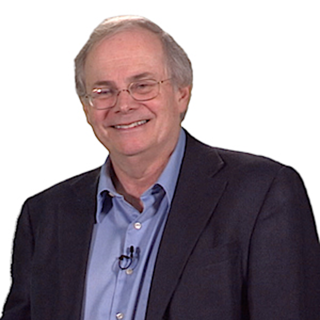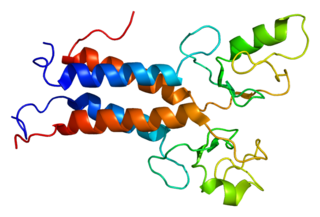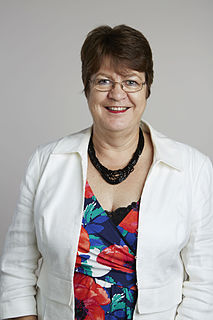Related Research Articles

Eva Nogales is a biophysicist at the Lawrence Berkeley National Laboratory and a Professor at the University of California, Berkeley, where she served head of the Division of Biochemistry, Biophysics and Structural Biology of the Department of Molecular and Cell Biology (2015-2020). She is a Howard Hughes Medical Institute investigator.
Ian Andrew Wilson is the Hansen Professor of Structural Biology and chair of the Department of Integrative Structural and Computational Biology at the Scripps Research Institute in San Diego, California, United States.

David Baker (born October 6, 1962, in Seattle, Washington is an American biochemist and computational biologist who has pioneered methods to predict and design the three-dimensional structures of proteins. He is the Henrietta and Aubrey Davis Endowed Professor in Biochemistry and an adjunct professor of Genome Sciences, Bioengineering, Chemical Engineering, Computer Science, and Physics at the University of Washington. He serves as the Director of the Rosetta Commons, a consortium of labs and researchers that develop biomolecular structure prediction and design software. He is a Howard Hughes Medical Institute investigator and a member of the United States National Academy of Sciences. He is also the director of the University of Washington's Institute for Protein Design.

Gregory A. Petsko is an American biochemist and member of the National Academy of Sciences, the National Academy of Medicine, the American Academy of Arts and Sciences, and the American Philosophical Society. He is currently Professor of Neurology at the Ann Romney Center for Neurologic Diseases at Harvard Medical School and Brigham and Women's Hospital. He formerly had an endowed professorship in Neurology and Neuroscience at Weill Cornell Medical College and is still an adjunct professor of Biomedical Engineering at Cornell University, and is also the Gyula and Katica Tauber Professor, Emeritus, in biochemistry and chemistry at Brandeis University.

Arieh Warshel is an Israeli-American biochemist and biophysicist. He is a pioneer in computational studies on functional properties of biological molecules, Distinguished Professor of Chemistry and Biochemistry, and holds the Dana and David Dornsife Chair in Chemistry at the University of Southern California. He received the 2013 Nobel Prize in Chemistry, together with Michael Levitt and Martin Karplus for "the development of multiscale models for complex chemical systems".

BRCA1-associated RING domain protein 1 is a protein that in humans is encoded by the BARD1 gene. The human BARD1 protein is 777 amino acids long and contains a RING finger domain, four ankyrin repeats, and two tandem BRCT domains.
Thomas Dean Pollard is a prominent educator, cell biologist and biophysicist whose research focuses on understanding cell motility through the study of actin filaments and myosin motors. He is Sterling Professor of Molecular, Cellular & Developmental Biology and a Professor of Cell Biology and Molecular Biophysics & Biochemistry at Yale University. He was Dean of Yale's Graduate School of Arts and Sciences from 2010 to 2014, and President of the Salk Institute for Biological Studies from 1996 to 2001.
Wayne A. Hendrickson is an American biophysicist and University professor at Columbia. Dr. Hendrickson is a University Professor at Columbia University in the Department of Biochemistry and Molecular Biophysics and Violin Family Professor of Physiology and Cellular Biophysics. He is also Chief Life Scientist in the Photon Sciences Directorate at Brookhaven National Laboratory and Scientific Director of the New York Structural Biology Center. Hendrickson has a B.A. from the University of Wisconsin at River Falls, a Ph.D. in biophysics at Johns Hopkins University with Warner Love, and postdoctoral research experience with Jerome Karle at the Naval Research Laboratory (NRL). He and his colleagues use biochemistry and x-ray crystallography to study molecular properties in atomic detail with current emphasis on membrane receptors and cellular signaling, on viral proteins and HIV infection, on molecular chaperones and protein folding, and on structural genomics of membrane proteins. Hendrickson's advances in diffraction methodology have contributed significantly to the emergence of structural biology as a major force in modern biology and molecular medicine.

Stephen C. Harrison is professor of biological chemistry and molecular pharmacology, professor of pediatrics, and director of the Center for Molecular and Cellular Dynamics of Harvard Medical School, head of the Laboratory of Molecular Medicine at Boston Children's Hospital, and investigator of the Howard Hughes Medical Institute.

Lynne Regan is a Professor of Biochemistry and Biotechnology at the School of Biological Sciences at the University of Edinburgh. Previously, she was a Professor of Molecular Biophysics and Biochemistry at Yale University. She was the president of the Protein Society for the 2013–2014 term and has earned many awards throughout her career. Her research mainly concerns interactions between proteins and nucleic acids.

Roger Sidney Goody is an English biochemist who served as director at the Max Planck Institute for Molecular Physiology in Dortmund from 1993 until 2013. Since 2013 he is Emeritus Director of the institute.
Sheena Elizabeth Radford FRS FMedSci is a British biophysicist, and Astbury Professor of Biophysics in the Astbury Centre for Structural Molecular Biology, School of Molecular and Cellular Biology at the University of Leeds. Radford is the Associate Editor of the Journal of Molecular Biology.
Gabriel Waksman FMedSci, FRS, is Courtauld professor of biochemistry and molecular biology at University College London (UCL), and professor of structural and molecular biology at Birkbeck College, University of London. He is the director of the Institute of Structural and Molecular Biology (ISMB) at UCL and Birkbeck, head of the Department of Structural and Molecular Biology at UCL, and head of the Department of Biological Sciences at Birkbeck.

G. Marius Clore MAE, FRSC, FRS is a British-born, Anglo-American molecular biophysicist and structural biologist. He was born in London, U.K. and is a dual US/U.K. Citizen. He is a Member of the National Academy of Sciences, a Fellow of the Royal Society, a NIH Distinguished Investigator, and the Chief of the Molecular and Structural Biophysics Section in the Laboratory of Chemical Physics of the National Institute of Diabetes and Digestive and Kidney Diseases at the U.S. National Institutes of Health. He is known for his foundational work in three-dimensional protein and nucleic acid structure determination by biomolecular NMR spectroscopy, for advancing experimental approaches to the study of large macromolecules and their complexes by NMR, and for developing NMR-based methods to study rare conformational states in protein-nucleic acid and protein-protein recognition. Clore's discovery of previously undetectable, functionally significant, rare transient states of macromolecules has yielded fundamental new insights into the mechanisms of important biological processes, and in particular the significance of weak interactions and the mechanisms whereby the opposing constraints of speed and specificity are optimized. Further, Clore's work opens up a new era of pharmacology and drug design as it is now possible to target structures and conformations that have been heretofore unseen.

Jane Clarke is an English biochemist and academic. Since October 2017, she has served as President of Wolfson College, Cambridge. She is also Professor of Molecular Biophysics, a Wellcome Trust Senior Research Fellow in the Department of Chemistry at the University of Cambridge. She was previously a Fellow of Trinity Hall, Cambridge.

Mark Andrew Lemmon an English-born biochemist, is a professor of Pharmacology at Yale University where he co-directs the Cancer Biology Institute with Joseph Schlessinger and serves as Deputy Director of Yale Cancer Center.
Nieng Yan is a structural biologist and the Shirley M. Tilghman Professor of Molecular Biology at Princeton University. Her laboratory currently studies the structural and chemical basis for membrane transport and lipid metabolism.
Barry H. Honig is an American biochemist, molecular biophysicist, and computational biophysicist, who develops theoretical methods and computer software for "analyzing the structure and function of biological macromolecules."
Jens Meiler is a German-American biologist and structural chemist. He currently serves as a Professor of Chemistry and Associate Professor of Pharmacology and Biomedical Informatics at Vanderbilt University. His research focuses on protein structures and computational biology, drawing on interdisciplinary techniques from other sciences.

Nikolay V. Dokholyan is an American biophysicist, academic and researcher. He is a G. Thomas Passananti Professor and Vice Chair for Research at Penn State College of Medicine.
References
- ↑ Christensen, DE; Brzovic, PS; Klevit, RE (October 2007). "E2-BRCA1 RING interactions dictate synthesis of mono- or specific polyubiquitin chain linkages". Nature Structural & Molecular Biology. 14 (10): 941–8. doi:10.1038/nsmb1295. PMID 17873885.
- ↑ Vittal, V; Wenzel, DM; Brzovic, PS; Klevit, RE (September 2013). "Biochemical and structural characterization of the ubiquitin-conjugating enzyme UBE2W reveals the formation of a noncovalent homodimer". Cell Biochemistry and Biophysics . 67 (1): 103–10. doi:10.1007/s12013-013-9633-5. PMC 3758794 . PMID 23709311.
- ↑ Delbecq, SP; Rosenbaum, JC; Klevit, RE (21 July 2015). "A Mechanism of Subunit Recruitment in Human Small Heat Shock Protein Oligomers". Biochemistry. 54 (28): 4276–84. doi:10.1021/acs.biochem.5b00490. PMC 4512712 . PMID 26098708.
- ↑ "Biochemist Joins National Academy of Sciences". Reed Magazine. Retrieved 2022-03-16.
- ↑ "The Protein Society Announces Its 2016 Award Recipients" (Press release). Baltimore, MD: The Protein Society. 2016-03-08. Archived from the original on 2016-08-30. Retrieved 2017-03-10.
- ↑ "News from the National Academy of Sciences". April 26, 2021. Retrieved July 4, 2021.
Newly elected members and their affiliations at the time of election are: … Klevit, Rachel; professor, department of biochemistry, University of Washington, Seattle
, entry in member directory: "Member Directory". National Academy of Sciences. Retrieved July 4, 2021.